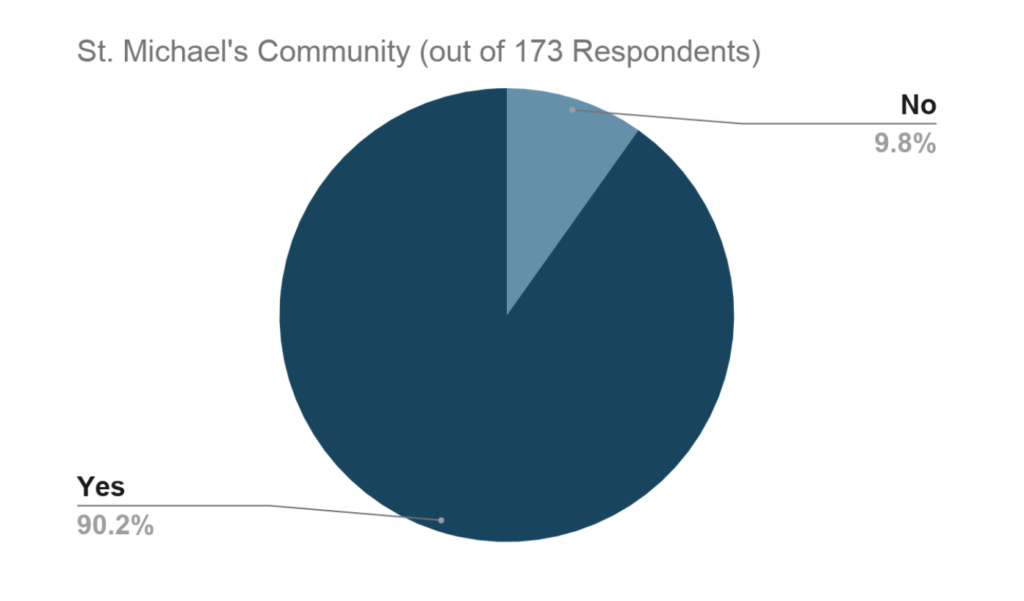
By Victoria Zambello
Executive Editor
On Dec. 14, Vermont Governor Phil Scott announced the incoming of 1,950 doses of the Pfizer/BioNTech COVID-19 Vaccine. With the recent news of the vaccine, 90.2 percent of the St. Michael’s Community said they would take the vaccine and 9.8 percent said they would not take the vaccine based on a Defender poll with 173 responses.
“Of all the vaccines that are being developed right now, this is the most rigorously studied and watched,” said Tracy Dolan, Deputy Commissioner for Public Health in a recent interview. “The best minds in the world have been contributing to this. The effectiveness is unprecedented, with a 95 percent effectiveness rate coming out of the gate and we do trust the FDA and CDC in terms of their protocols.”
But college students shouldn’t toss their masks away yet. The vaccine will be given out based on a list of criteria created by the Advisory Committee on Immunization Practices (ACIP). With initial doses provided to high-risk health care workers and residents of long-term care facilities, the typical college student will be far down on the phase list for the vaccine. Based on Oct. 23 Vermont Governor’s press release, college-aged students will be vaccinated in phase three.
It will take time for enough of the public to have the community immunity needed to fight this virus, Dolan explained.“Even though we have a vaccine starting now, which is really the very best news for this virus, it will be months before we see real changes in masking and social distancing.”

“This is just the start of a long process to receive and administer enough vaccines to bring COVID-19 under control,” said Health Commissioner Mark Levine, MD in his recent press statement on Dec. 14. “I can’t emphasize enough the importance of everyone keeping up their efforts to protect themselves and prevent the spread of the virus. This is a time for great optimism and even greater vigilance to make it all happen.”
How it works
The vaccine works with two doses, and unlike vaccines such as the flu shot, experts believe that the vaccine will last long-term. “Coronavirus has a very slow mutation and we anticipate that this round of vaccines, getting the first, and then the second will keep you protected for the long term. We anticipate it to be a long-term vaccine like you would get for measles that require usually one or two as a whole,” Dolan said.
According to the CDC, a second shot is applied after the first shot, in order to gain immunity from the disease. Common side effects, similar to any vaccine, include fever, chills, tiredness, and headaches.
St. Michael’s students, attending school on campus this spring, will still need to follow the Vermont guidelines on the vaccine, regardless of their home state. Although some students may have tested positive in the past, the Department of Health will not ask you about your history with COVID.
“Even though you may have tested positive for COVID and you may have an antibody response, you don’t know how strong that response is. With this vaccine, because we are controlling it, we know that this response will be very effective based on the trials we’ve done,” Dolan said. “For students that will eventually mean they will be less likely to get COVID and even more importantly less likely to pass it along to those who are most vulnerable.”
“I think the vaccine is going to make a huge difference with the fear that a lot of people are facing right now,” said Jordy Fenton ’22. “A lot are nervous about what it will mean, but to me, it’s a hopeful start in getting back some of the normalcy that we’re missing. Of course, it won’t happen all of a sudden and we still need to be careful, but it will feel so much better to be able to hug my grandmother without feeling like I’m putting her at risk.”
When students return back to campus in February, even with the vaccine, normalcy should not be expected.

“There is a practical light at the end of this tunnel and where we will come out the other side and hopefully will have a population that has achieved enough immunity that we can go back to what we thought of as normal life before,” Dolan said.

